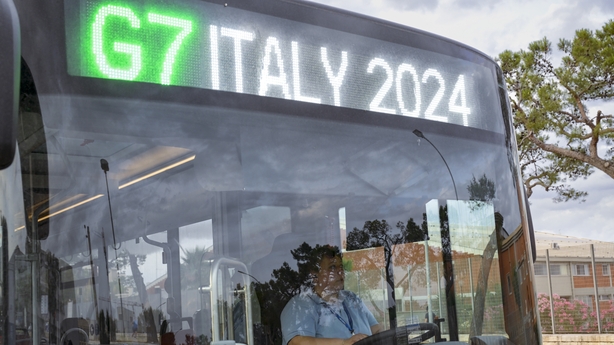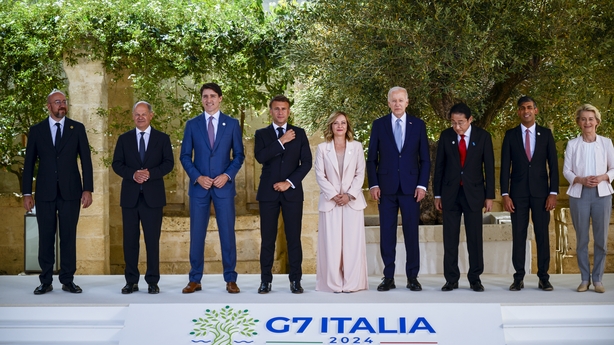The G7 leaders recommitted to support Ukraine "for as long as it takes", according to a draft statement from a summit.
"We are standing in solidarity to support Ukraine's fight for freedom and its reconstruction for as long as it takes," said the draft from the Italy talks, seen by AFP.
Yesterday's talks, attended by Ukrainian President Volodymr Zelensky, were marked by a strong show of G7 support for Kyiv in its war with Russia, and the agreement of a $50-billion new loan.
The leaders said in the draft statement that the amount sent "an unmistakable signal to (Russian) President Vladimir Putin".
The loan will be backed by profits from the interest accrued on Russian central bank assets frozen by Western powers after Moscow's February 2022 invasion of Ukraine.
"The G7 intends to provide financing that will be serviced and repaid by future flows of extraordinary revenues stemming from the immobilisation of Russian sovereign assets held in the European Union and other relevant jurisdictions," the draft statement said.
"To enable this, we will work to obtain approval in these jurisdictions to use future flows of these extraordinary revenues to service and repay the loans."
It said the money would be disbursed through "multiple channels that direct the funds to Ukraine's military, budget, and reconstruction needs -- within the constraints of our respective legal systems and administrative requirements".
The leaders tasked ministers and officials to start working on the technicalities to start providing the funds to Ukraine before the end of the year.
Mr Putin branded as "theft" the freezing of Russian assets abroad.
Mr Putin said Western countries were trying to come up with "some kind of legal basis" to justify these "but despite all the trickery, theft is still theft and will not go unpunished".
The Russian leader also warned the standoff between Moscow and the West was coming "unacceptably close to the point of no return," and boasted that Moscow "possesses the largest arsenal of nuclear weapons."
Mr Putin has repeatedly invoked nuclear rhetoric throughout the conflict with Ukraine, which he casts as just one front in a wider "hybrid war" between Russia and the NATO military alliance.

There were also tensions, with France and the United States criticising host Italy over its reported attempts to water down references to abortion access in the final summit statement.
The leaders began today's talks on a lighter note, singing "Happy Birthday" for German Chancellor Olaf Scholz, who turned 66, a diplomatic source said.
The summit comes amid souring trade relations between China and the West, exemplified by the European Union's announcement this week of plans to impose new tariffs on Chinese electric vehicles.
The G7 leaders turned their attention to China earlier today, from security in the Asia-Pacific to how best to protect their industries while avoiding an outright trade war with Beijing.
US President Joe Biden and the leaders of Japan, Italy, France, Germany, Canada and Britain opened the second day of their summit in Puglia with talks on migration.
But the key session comes before lunch, focusing on fair trade with the world's second-largest economy, notably on green technology.
Japanese Prime Minister Fumio Kishida was set to lead the talks, which officials said would also address North Korea and territorial disputes between China and its neighbours.
In addition, the Group of Seven rich democracies will be seeking a common response to China's alleged support of Russia's military expansion, which Washington says is fuelling the war in Ukraine.
"G7 countries are on the same page vis-a-vis China," a Japanese government source told AFP.
Beijing denounced what it called "naked protectionist behaviour" and said it reserved the right to file a suit with the World Trade Organization (WTO).
The US, Japan and the EU - which attends G7 summits as an unofficial eighth partner - have all voiced concern over China's so-called "industrial overcapacity".
They say generous subsidies by Beijing, particularly in green energy and technology sectors such as solar panels and electric vehicles, result in unfairly cheap goods flooding the global market.
That excess capacity threatens Western companies struggling to compete, particularly in the growing green tech sector.
"We will confront China's non-market policies that are leading to harmful global spillovers," John Kirby, the US National Security Council spokesman, told journalists ahead of the summit.
China has dismissed the concerns but Washington is pressing for a united G7 front.
The group's finance ministers warned last month that they would weigh steps to "ensure a level playing field" for all countries.
Another focus today is China's recent restrictions on exports of minerals such as gallium, germanium and graphite, which are critical in industries such as telecommunications and electric vehicles.
The curbs threaten international supply chains, and there are fears they could be followed by restrictions on other materials such as rare earth elements crucial for electronics.

Russia's war machine
The G7 leaders will also address security and defence concerns, including accusations Beijing has helped expand Russia's armed forces.
Mr Biden yesterday said the group had "agreed to taking collective action" against China's role in supplying Russia with "materials they need for their war machine".
Washington has accused Beijing of helping Russia's defence industry - and therefore its invasion of Ukraine - through joint production of drones and exports of machine tools needed for ballistic missiles.
At a joint press conference with Mr Biden, Mr Zelensky said he had spoken by phone to Chinese President Xi Jinping, who "gave me his word" that he would not sell weapons to Russia.
"We will see," Mr Zelensky added.
On the agenda is also wider security in the Asia-Pacific, where China's confrontational tactics and militarisation of islands in the South China Sea - as well as its recent war games around self-ruled Taiwan - have increased fears of a potential conflict.
At the last G7 summit, in Japan, the leaders said in their final statement that they "oppose China's militarisation activities in the region".
The Japanese government source said it was crucial for the leaders in Puglia to send a clear message to Xi that the issue was not merely regional, but of concern to all the G7 nations.
"All the (G7) countries are aware that we need to convey the message very candidly to the Chinese at the very top level," the source said.
Pope Francis arrived at a G7 summit as the first head of the Catholic Church to take part in the meeting of rich nations.
The pontiff, 87, will speak about the risks and rewards of artificial intelligence and hold 10 bilaterals with the leaders of the United States, India, Ukraine, Turkey and Brazil, among others.

